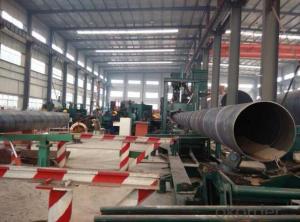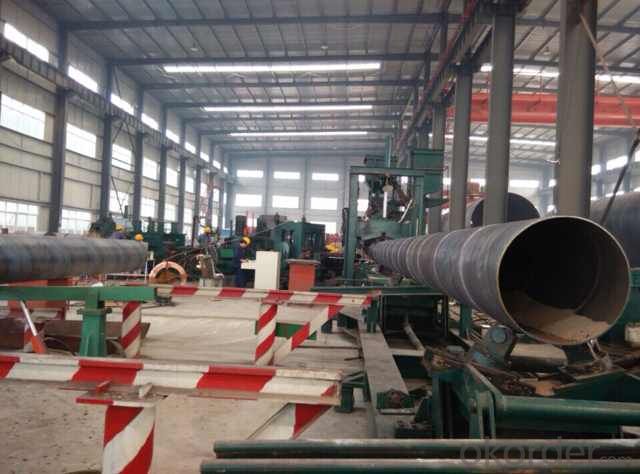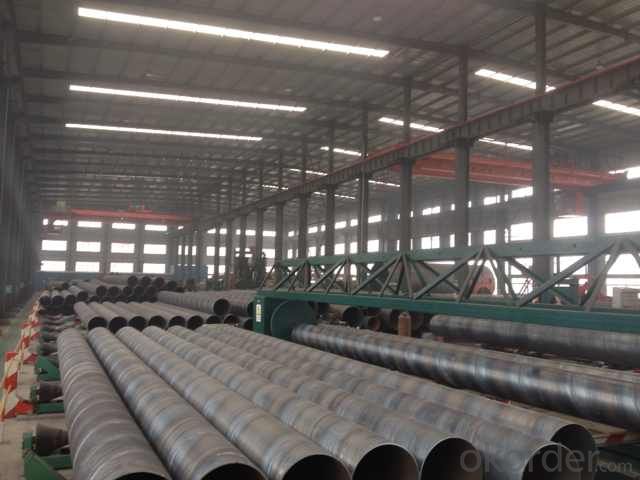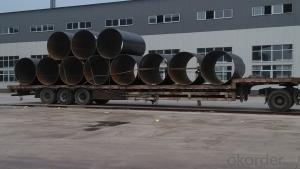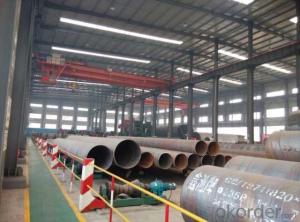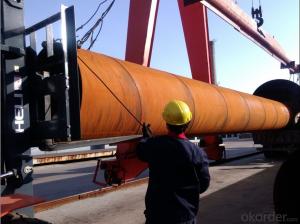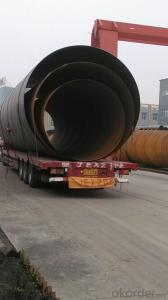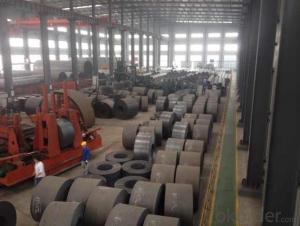SSAW CARBON STEEL PIPE 219-3920MM
- Loading Port:
- China Main Port
- Payment Terms:
- TT OR LC
- Min Order Qty:
- -
- Supply Capability:
- -
OKorder Service Pledge
OKorder Financial Service
You Might Also Like
Packaging & Delivery
Packaging Detail: | standard export packing or as customer's requirement |
Delivery Detail: | within 10 - 30 days |
Specifications
Spiral Welded Steel Pipes and Tubes
1.Material:Q195-Q235
2.Length:1-12m
3.WT:1.0-14mm
4.O.D.:219-3920mm
Product Description:
1.Material : Q235,Q345,L245,L290,L360,L415,L450,L485,GrB,X42,46,X52,X56,X60,X65,X70,X80,X100
2,Standard: SY/T5037-2000,GB/T9711-2011,API Spec 5L PSL1/PSL2,ASTM A252\A53,ISO3183,DIN17172,EN10217,JIS G3457,AWWA C200,ASTM A139,ASTM A671,ASTM A672
3.Wall thickness: 3.0mm-30mm
4.Outer diameter: φ219mm-3920mm
5,Length: 5m-12m or as customer requirement
6,Corrosion protection standard: DIN30670,DIN30671, AWWAC210, AWWA C203, SY/T0413-2002,SY/T0414-2002
7,Application: Oil, gas, natural gas, water pipe, thermal electricity pipe, steel structure engineering, etc
Q195-Q345 Material Steel Pipe's Materials
Elements | Chemical Compsition% | Mechanical Property | ||||||
| C% | Mn% | S% | P% | Si% | Yield Point (Mpa) | Tensile Strength(Mpa) | Elongation |
Q195 | 0.06-0.12 | 0.25-0.50 | <0.050 | <0.045 | <0.030 | >195 | 315-430 | 32-33 |
Q215 | 0.09-0.15 | 0.25-0.55 | <0.05 | <0.045 | <0.030 | >215 | 335-450 | 26-31 |
Q235 | 0.12-0.20 | 0.30-0.70 | <0.045 | <0.045 | <0.030 | >235 | 375-500 | 24-26 |
Q345 | <0.20 | 1.0-1.6 | <0.040 | <0.040 | <0.55 | >345 | 470-630 | 21-22 |
- Q: Can steel pipes be used for the construction of high-rise buildings?
- Yes, steel pipes can be used for the construction of high-rise buildings. Steel pipes offer several advantages such as high strength, durability, and resistance to fire and corrosion. They can be used for various structural elements including columns, beams, and bracing systems, providing a reliable and cost-effective solution for constructing tall buildings.
- Q: Are steel pipes suitable for nuclear power plants?
- Yes, steel pipes are suitable for nuclear power plants. Steel pipes are commonly used in nuclear power plants due to their high strength, durability, and resistance to high temperatures and pressures. They are used for various applications such as transporting coolant, steam, and other fluids within the plant. Additionally, steel pipes can be fabricated to meet specific requirements and withstand the harsh operating conditions of nuclear power plants, making them a reliable and suitable choice for this industry.
- Q: How do you clean steel pipes?
- To effectively clean steel pipes, there are several steps that can be followed: 1. Collect the necessary supplies: You will require a pipe cleaning solution, either a scrub brush or wire brush, and safety gear like gloves and goggles. 2. Prepare the cleaning solution: Dilute the pipe cleaning solution according to the instructions provided on the packaging. Ensure that you select a solution suitable for steel pipes. 3. Prioritize safety: Put on your safety gear to safeguard yourself from any potential hazards. 4. Eliminate any debris: Before applying the cleaning solution, eliminate any loose debris or dirt from the surface of the steel pipes. You can utilize a brush or cloth to wipe away any visible particles. 5. Apply the cleaning solution: Immerse the brush into the prepared cleaning solution and administer it to the steel pipes. Ensure that you cover the entire surface, particularly focusing on areas with stubborn dirt or grime. 6. Scrub the pipes: Thoroughly scrub the steel pipes using the brush, applying pressure as needed to eliminate any buildup or stains. Pay extra attention to joints or hard-to-reach areas. 7. Rinse with water: Once you have completed the scrubbing, rinse the pipes with clean water to eliminate the cleaning solution and any remaining dirt. You can pour water over the pipes or employ a hose if available. 8. Dry the pipes: After rinsing, use a cloth or towel to completely dry the steel pipes. This will aid in preventing water stains or corrosion. 9. Inspect for cleanliness: Take a moment to inspect the pipes and ensure that they are clean. If there are still areas with stubborn dirt or stains, you may need to repeat the cleaning process or consider using a different cleaning solution. Always remember to adhere to the manufacturer's instructions when using cleaning solutions and to take appropriate safety measures.
- Q: Are steel pipes suitable for hydronic heating systems?
- Yes, steel pipes are suitable for hydronic heating systems. Steel pipes are known for their durability, strength, and resistance to high temperatures and pressure, making them an excellent choice for circulating hot water in hydronic heating systems. They can effectively handle the demands of heating systems and provide reliable and long-lasting performance.
- Q: Are steel pipes resistant to impact?
- Yes, steel pipes are generally resistant to impact due to their high strength and durability.
- Q: How do steel pipes handle high-velocity flow?
- Steel pipes are highly capable of handling high-velocity flow due to their inherent strength and durability. The robustness of steel allows it to withstand the pressure exerted by the high-velocity flow, minimizing the risk of deformation or failure. Additionally, steel pipes have smooth interiors, which reduces frictional losses and ensures efficient flow rates even at high velocities.
- Q: What are the different types of steel pipe valves?
- There are several types of steel pipe valves, including gate valves, globe valves, ball valves, check valves, and butterfly valves. Each type of valve serves a specific purpose and has its own unique features and applications in various industries.
- Q: What is the difference between steel pipes and ductile iron pipes?
- Steel pipes and ductile iron pipes are both commonly used for plumbing and industrial applications, but there are notable differences between them. The main difference lies in their composition and mechanical properties. Steel pipes are made primarily from iron and carbon, with small amounts of other elements added for strength and corrosion resistance. On the other hand, ductile iron pipes contain a higher percentage of carbon and small amounts of other elements like silicon and manganese, which give them improved ductility and resistance to cracking. Consequently, steel pipes are typically stronger and more rigid, suitable for high-pressure applications, while ductile iron pipes offer better flexibility and impact resistance, making them ideal for underground installations and areas prone to ground movement. Additionally, steel pipes are usually more expensive than ductile iron pipes due to their higher strength and corrosion resistance.
- Q: How are steel pipes used in HVAC systems?
- Steel pipes are commonly used in HVAC systems for transporting hot or cold water, as well as other fluids like refrigerants and condensate. They are durable, resistant to corrosion, and can withstand high pressure, making them ideal for carrying fluids throughout the system. Steel pipes are typically used for water supply lines, steam distribution, and hydronic heating and cooling systems in HVAC installations.
- Q: Are galvanized steel tubes the same as degaussing steel tubes?
- And the method of magnetic field created by means of electromagnets or permanent magnets. For analysis of residual magnetism, see table (1), select the demagnetizing method and system in combination with the conditions of the construction site (for example, given equipment, etc.). Table 1 magnetic remanence grade and welding conditions
Send your message to us
SSAW CARBON STEEL PIPE 219-3920MM
- Loading Port:
- China Main Port
- Payment Terms:
- TT OR LC
- Min Order Qty:
- -
- Supply Capability:
- -
OKorder Service Pledge
OKorder Financial Service
Similar products
Hot products
Hot Searches
Related keywords
